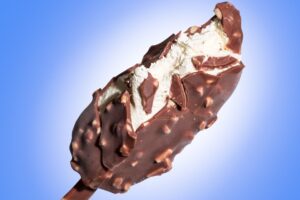
The Polish Agricultural and Food Products Quality Inspectorate (IJHARS) in Poznan has issued a decision to ban the circulation of a batch of ice cream in cones weighing 7.13 tons imported from Ukraine.
The decision was made due to incorrect labeling, the inspectorate reported on social media platform X on Monday.
The decision was immediately enforced.
As reported, on April 12, the IJHARS banned access to the Polish market for two batches of sponge cakes weighing 10.55 thousand tons imported from Ukraine, and on April 9, three batches of Ukrainian bagels weighing 5.34 tons. Earlier, three batches of Ukrainian ice cream weighing 8.48 tons were seized in Lublin because it was defrosted.
In early April, the Polish Trade Inspectorate announced the largest fine in its history of 1.5 million zlotys (about $380 thousand) imposed on an importing company for importing 11.5 thousand tons of technical rapeseed and feed wheat from Ukraine as counterfeit goods for further use as food. In addition, a decision was made to ban the import of 57.66 tons of tomato paste from Ukraine due to the presence of mold.
In March, IJHARS Chief Inspector Przemysław Rzodkiewicz said that over the past year, 1.4% of the batches of products from Ukraine inspected by the commission at the border were rejected.

Ukrainian ice cream and frozen semi-finished products producer Three Bears has acquired Nordis, which owns a plant for the production of semi-finished products and ice cream in Poland, the company’s founder Dmytro Ushmayev told the Ukrainian edition of Forbes.
“We have indeed acquired the Nordis plant in Poland. Nordis is similar in potential to Three Bears,” Ushmayev said.
The owner of the company refused to disclose the amount of the deal and clarified that the Ukrainian company plans to invest in the development of production in Poland.
According to the Ministry of Justice of Poland, in September 2023, the management of the Polish plant for the production of semi-finished products and ice cream Nordis changed. Dmitry Ushmayev, founder of Three Bears, became the new owner of the company. Andriy Tyshchenko, director of the Ukrainian manufacturer, has also joined Nordis’ supervisory board.
Nordis owns a plant in western Poland and warehouses. The company produces more than 100 types of ice cream and semi-finished products. Nordis also has a distribution network in 19 cities in Poland. The previous owner and CEO of Nordis was Slawomir Jankowski.

One of the world giants in the food market, Dutch-British company Unilever is going to produce next year a dairy ice cream, made from cow’s milk, grown in a laboratory.
Next summer, supermarket shelves may be stocked with ice cream “made from cow’s milk without cows. It will be made from milk protein obtained by fermentation, which uses yeast and fungi, among other ingredients, to grow it in vats.
However, natural cow’s milk contains many types of protein, so producing it in the lab with a satisfactory result that allows the product to be used in the same way as “classic” milk is no easy task.
A number of startups have already submitted several prototypes of “lab milk” for consideration by Unilever. The company hopes to commercialize next year a new ice cream under one of its world-famous brands – Ben & Jerry’s, Miko, Magnum, but has not yet specified which one it will choose for the debut.
Unilever explains its idea as the aim to produce the product with less greenhouse gas emissions, particularly methane, which is inevitable in dairy farming, subject to the profitability of the new technology.
However, Unilever is not the first company in the food market, trying to introduce “milk without a cow. Last year, American Starbucks already tried to sell products based on “lab milk” produced by the startup Perfect Day in its cafes in the Seattle area.

The export of Ukrainian ice cream for the period 2016-2020 increased by one and a half times, to 6,740 tonnes, while in January-April 2021 this figure increased 20% compared to January-April 2020, to 2,300 tonnes, the State Service for Food Safety and Consumer Protection of Ukraine said in a press release on Friday.
“The growth of exports testifies to the high quality of Ukrainian products, which are valued both in Ukraine and abroad. It is pleasant that almost half of Ukrainian ice cream exports go to the EU countries, with which trade is intensifying in many trade positions,” Head of the authority Vladyslava Mahaletska said.
According to the authority, in the first six months of 2021 Ukraine exported 1,080 tonnes of ice cream, of which 46.8% went to the EU countries. In total, Ukraine supplies this product to more than 50 countries of the world, mainly to Moldova, China, and Israel.

Ukrainian enterprises in January-May 2018 increased production of ice cream by 1.7% compared to the same period in 2017, to 42,800 tonnes.
“In January-May the volume of ice cream production in Ukraine amounted to 42,800 tonnes, growth stood at 1.7%. For the five months, 2,900 tonnes were exported, a growth of 23.1%. Ice cream exports to the EU amounted to 232 tonnes, or 8% of the total export. I expect that by the end of this year production and exports will show growth,” Ihor Bartkovsky, the president of the Association of Ukrainian Producers “Ice Cream and Frozen Food,” at a press conference in Kyiv.
According to him, ice cream is exported from Ukraine to more than 50 countries.
“In 2017 Ukraine produced 96,600 tonnes of ice cream, which is 2.4% more than in 2016. Exports totaled more than 5,000 tonnes, an increase of 13.5%, in particular, 336 tonnes were exported to EU countries, or 7% of total exports,” Bartkovsky said.
He noted that over the past three years, ice cream consumption in Ukraine has increased.
At the same time, ice cream consumption per capita in Ukraine remains low.